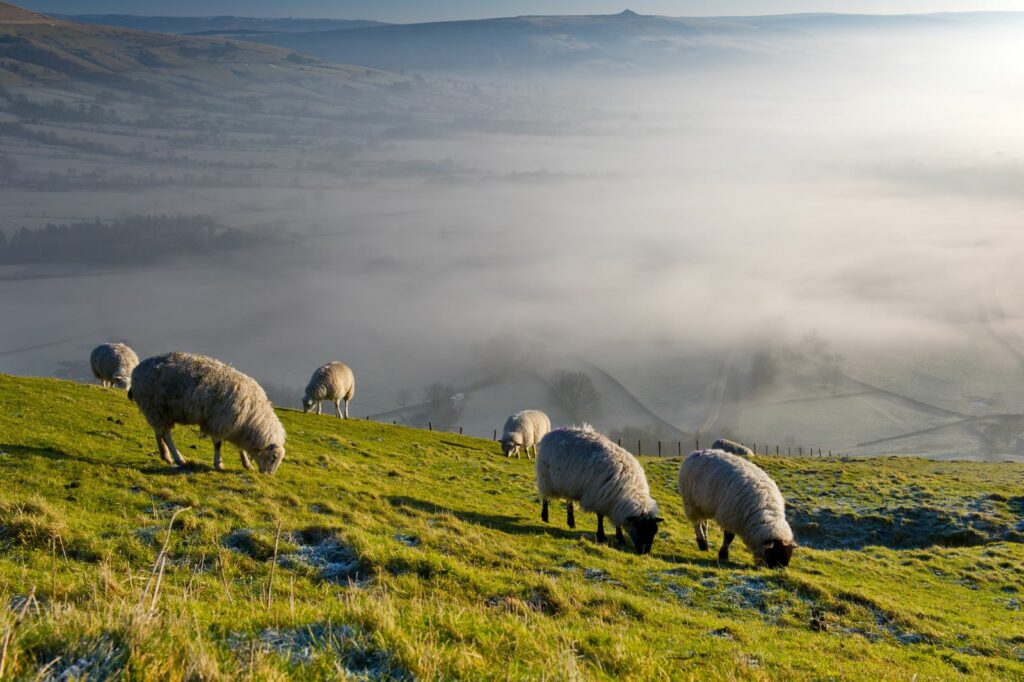NSA responds to former Defra rep’s ‘damaging statement’ on UK sheep farming
17th March 2023
The National Sheep Association (NSA) regarded former Defra advisor Ben Goldsmith’s comments on sheep farming in the UK as ‘naïve’ and ‘uneducated’ in a statement issued to defend the valuable role sheep fulfill in the UK countryside.

Sheep grazing in Peak District National Park, UK.
Mr Goldsmith’s controversial tweet earlier this week sparked debates about the role of sheep farming in the UK economy and whether or not sheep belong on Britain’s landscapes. The ex-Defra rep wrote on Twitter:
‘It’s time to talk about sheep. The unavoidable truth is that sheep are the principal obstacle standing in the way of meaningful nature recovery in Britain’s national parks and other agriculturally marginal landscapes. There is no getting around it. The sheep have got to go.
‘It is because of forensic grazing by tens of millions of sheep that great swathes of Britain are largely of trees and scrub, and impoverished of wildflowers, birdsong, wildlife. Go and visit any of our national parks and you’ll see for yourself.
‘If it wasn’t for sheep, there would be little meaningful objection to the reintroduction of lynx, wolves, and other iconic but temporarily missing British species – the absence of which has triggered a parallel explosion in the number of deer, which only exacerbates overgrazing in what should be our most precious landscapes.’
Mr Goldsmith also called out the supposed ‘brutal impact’ sheep have on soil structure and vegetation, and suggested replacing sheep farming with native cattle grazed in silvopasture systems.
‘Sheep are not native to Britain. They come from the arid hills of Asia Minor. They must suffer terribly soaked through and exposed on our windy, wet hillsides year-round. The fact that even English acorns are toxic to sheep says it all.’
He also criticised the sector for receiving subsidised funding to produce a food item he believes doesn’t advance the UK economy.
‘Britons don’t eat much lamb or mutton. So why are our landscapes stuffed with sheep? Sheep farming is in economic terms hopelessly non-viable, propped up solely with taxpayer subsidies. The average age of sheep farmers creeps ever higher, while their net income (including subsidies) creeps ever lower. There are no winners, only losers.
‘I don’t buy lamb or mutton any longer. It’s not right. If people want to keep sheep, of course that’s their absolute right, but they should not be subsidised with public money for doing so,’ Mr Goldsmith concluded.
NSA expresses disappointment over “ignorant” allegations
The former Defra rep’s comments have been met with backlash from both farmers and members of the public, who have called out a number of factual inaccuracies in his statement on Twitter.
Responding to the post, NSA chief executive Phil Stocker said: “Sheep have been in the British Isles since the Neolithic settlers landed on our shores around 3000BC- 5000 years ago.
“They have created and maintained some of the most loved landscapes we see and enjoy today including nine of England’s 13 National Parks that are situated in upland areas. It is no accident that most of our National Parks are in areas predominated for generations by grassland and sheep.
“The unique environment, working for most times in harmony with sheep farming, is highly valuable in relation to water management and quality, carbon sequestration, and nature, and provides people with social and health benefits.”
While there may have been a time when UK sheep farming was primarily focused on production, the sector has been increasingly moving towards practices that consider the wider environment, in line with the rest of the industry, the NSA pointed out.
To illustrate, in 2021, there was a 40% increase in demand and applications for Countryside Stewardship (CS), and more than 40,000 farmers in England now participate in either CS or legacy Higher-Level Stewardship (HLS) schemes, which offer farmers financial incentives for looking after and improving the environment.
“Both the Countryside Stewardship schemes, HLS, and the new Environmental Land Management schemes have the environment and nature at their heart, ensuring the wildlife of Britain has increasingly improving habitats.
“The success of many of our native wildlife lifecycles are directly linked to livestock grazing providing food, nutrients, and a favourable environment,” Mr Stocker added.
Moreover, 53% of Sites of Special Scientific Interest (SSSI) land is located in the UK’s uplands, with 96% of those areas being in favourable or recovering condition. Upland farmers have long managed these landscapes, providing further evidence that appropriate grazing is key to conserving many priority habitats such as limestone grassland and upland heath.
Mr Stocker concluded: “NSA is incredibly disappointed that senior officials and Defra representatives can at times be ignorant to the benefits of grazing animals and the value of British produce and strongly urge the Department to ensure an improved understanding of those who would benefit from a better appreciation of this.”
